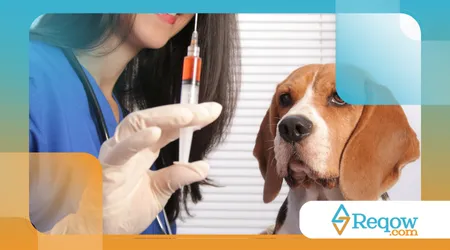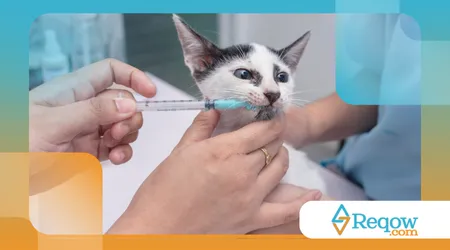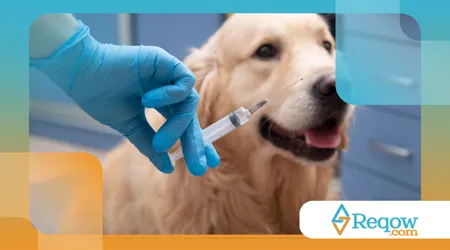Vaccination and deworming guide: what your pet needs at each stage of life

Vaccination and deworming guide. The journey of having a pet is one of life's most rewarding experiences.
Advertisements
In other words, we bring home a being who, from the very first moment, gives us unconditional love, joy and a friendship that lasts a lifetime.
But, just like ours, their well-being requires care, attention and, above all, protection.
The health of our pets is a direct reflection of our commitment, and understanding the pillars of this protection is the first step in ensuring they live a full and healthy life.
In this context, vaccinations and deworming appear not as an obligation, but as a protective shield that defends them from the invisible threats that lurk in the outside world.
Advertisements
The Immunity Calendar: Protecting Puppies
Therefore, the first year of a puppy's life is crucial for the formation of its immunity.
It's a delicate period, when little ones are more vulnerable to serious and sometimes fatal illnesses. Vaccination and deworming guide begins at the most tender stage.
Therefore, the first dose of the vaccine, the polyvalent (V8 or V10), should be administered around 45 days of age, followed by boosters.
This vaccine protects against distemper, parvovirus, adenovirus, parainfluenza, coronavirus and leptospirosis.
Then, the rabies vaccine, mandatory in many cities, becomes part of the schedule, usually after four months of age.
Otherwise, a common mistake is to neglect deworming, but it is just as vital as vaccinations.
Puppies are often infected with worms while still in their mother's womb or through breastfeeding.
In other words, deworming should begin early, around 2 weeks of age, repeating every 15 or 20 days, as per the veterinarian's instructions, until six months.
This frequency ensures that the parasites' life cycle is broken before they cause serious problems, such as anemia and malnutrition.
Maintaining Health in Adulthood: An Ongoing Commitment
On the other hand, when the pet reaches adulthood, the frequency of vaccinations and deworming changes, but the commitment remains.
Immunity acquired in the initial phase does not last forever. Therefore, annual booster doses of the polyvalent and rabies vaccines are essential.
And here, discipline becomes the key word.
A study published in the University of Wisconsin-Madison Journal of Veterinary Medicine in 2023 demonstrated that annual vaccination reduced parvovirus cases by 95% in adult dogs exposed to the virus.
Read more: Step by step guide to deep cleaning your dog's toys
Deworming in adults follows a different schedule, usually every 3 to 6 months. However, the frequency can vary.
Pets that live in apartments and don't have contact with other animals may have a more spaced schedule than those that frequent parks and interact with other dogs or cats.
Therefore, the importance of a Vaccination and deworming guide is to individualize the treatment for each case.

The Wisdom of Age: Caring for Senior Pets
On the other hand, the senior stage, from 7 or 8 years of age, requires extra attention. Just like in humans, older pets' immunity can begin to decline.
Annual vaccinations become even more crucial to keep them protected. Additionally, deworming must be maintained.
At this stage, it's crucial to watch for signs of illness. A useful analogy is the maintenance of an old car.
The experienced driver knows that the car, although still strong and reliable, requires more frequent check-ups.
Find out more: How to Train Cats: Effective Techniques for Felines
Likewise, an older pet needs more regular checkups to detect health problems early.
For example, a senior dog with arthritis may require supplements, while an elderly cat may have kidney problems that require a specific diet.
Prevention in Cats: A Vaccination and Deworming Guide Differentiated
Therefore, although they share the need for protection, dogs and cats have different schedules and needs.
THE Vaccination and deworming guide For felines, it begins with the quadruple vaccine (V4), which protects against rhinotracheitis, calicivirus, panleukopenia, and chlamydiosis. The first dose is administered after 60 days, with boosters.
The rabies vaccine, as for dogs, is mandatory and must be administered after four months.
For cats that go outside or live with other felines, the Feline Leukemia (FELV) vaccine is highly recommended.
More information: Ways to entertain your dog on rainy days
Deworming cats is also essential. Intestinal worms are common and can be transmitted by fleas or contact with other cats' feces.
It is a vital process for the feline's health and the well-being of the entire family.
The Importance of Protection and Diagnosis
The truth is that a Vaccination and deworming guide It's not just a list of procedures. It's a mutual protection contract.
In other words, the protection we offer them is the foundation for the life they give us. And it's not just about deworming and vaccinating.
It's also important to be aware of signs such as apathy, lack of appetite, or changes in behavior, which may indicate the need for immediate veterinary evaluation.
What your pet needs at each stage of life
| Stage of Life | Dog | Cat |
| Puppy (2 to 6 months) | Polyvalent vaccine (V8 or V10): 3 doses, 21 to 30 days apart. Rabies vaccine: single dose after 4 months. Deworming: from 2 weeks, every 15-20 days. | Quadruple Vaccine (V4): 2 to 3 doses, 21 to 30 days apart. Rabies Vaccine: single dose after 4 months. Deworming: every 15-20 days after 15 days. |
| Adult (1 to 7 years) | Polyvalent vaccine: annual booster. Rabies vaccine: annual booster. Deworming: every 3 to 6 months. | Quadruple vaccine: annual booster. Rabies vaccine: annual booster. FELV vaccine: annual booster. Deworming: every 3 to 6 months. |
| Senior (after 7 years) | Polyvalent vaccine: annual booster. Rabies vaccine: annual booster. Deworming: every 3 to 6 months. | Quadruple vaccine: annual booster. Rabies vaccine: annual booster. FELV vaccine: annual booster. Deworming: every 3 to 6 months. |

A Bond of Care, Not of Risk
Protecting our pets is a responsibility we embrace with affection and dedication.
Therefore, the Vaccination and deworming guide It is more than a series of procedures; it is the materialization of our love for them.
It's an investment in the health, longevity and joy they bring us.
By following a proper care schedule, we ensure that every lick, purr, and cuddle is worry-free. After all, who else can care for them?
Frequently Asked Questions
1. Can I vaccinate my pet at home, without a veterinarian present?
No, vaccination should be administered exclusively by a veterinarian. The vaccine is a sensitive biological product and must be handled correctly to maintain its effectiveness.
2. What if my pet is afraid of going to the vet?
It's essential that your pet feels safe. The veterinarian will handle your pet with care and affection. You can bring some toys or treats to help distract them.
3. Are vaccinations and deworming enough to ensure my pet's health?
No, they're just the beginning. Quality nutrition, regular exercise, environmental enrichment, and routine veterinary checkups are essential for a long and healthy life.
4. What happens if my pet misses a booster dose?
The vaccine's effectiveness is compromised. It's important to consult your veterinarian as soon as possible so they can assess whether it's necessary to restart the vaccination schedule or administer the missed dose, depending on the timing.
5. What should I do if my pet has adverse reactions to the vaccine?
Reactions such as fever, lethargy, or pain at the injection site are common and usually disappear within 24 to 48 hours.
But in cases of more severe reactions such as facial swelling, hives or difficulty breathing, seek immediate veterinary attention.
